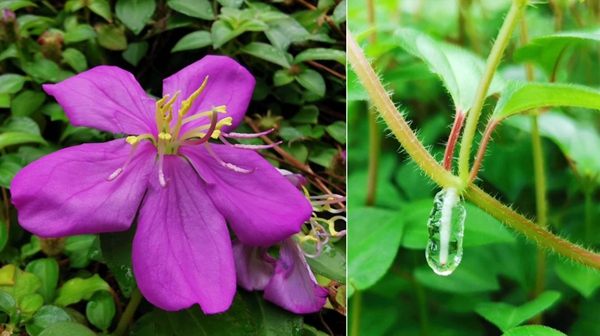Plant-associated microbes play an important role in host nutrient utilization, stress tolerance, plant health, and adaptation. Identifying the key mucilage compound and friendly microbe, as well as their protective association with diazotrophic microbiota, is of great value in understanding the microbial homeostasis of the mucilage-microbiota system.
In a study published in Microbiome, researchers from the Xishuangbanna Tropical Botanical Garden (XTBG) of the Chinese Academy of Sciences and their collaborators investigated the phenomenon of microbiota-mediated nitrogen fixation and elucidated how this process is continuously maintained in the root mucilage microhabitat.
The researchers used pink lady (Heterotis rotundifolia), a fast-growing, perennial shrub, dicotyledonous and highly invasive plant, to explore the biological function of the aerial root-mucilage system and the underlying mechanisms in dicotyledons. They also wanted to see how the mucilage microhabitat maintained its function and homeostasis in the fluctuant open air.
The researchers compared the biochemical composition of the aerial root mucilage (ARM or mucilage) and underground root exudates (URE) by collecting comprehensive metabolomics data of these samples. They confirmed that ARM and URE have distinct biochemical compositions from each other, both in terms of primary and specialized metabolites.
Metabolite and microbiota profiling showed that the aerial root mucilage is enriched in carbohydrates and diazotrophic bacteria. Nitrogen isotope-labeling experiments, 15N natural abundance, and gene expression analysis indicated that the aerial root-mucilage microbiota could fix atmospheric nitrogen to support plant growth. While the aerial root mucilage is a nutrient hotspot, they did not observe a high abundance of other environmental and pathogenic microbes in it.
In addition, the researchers discovered a friendly fungus, Chaetomella raphigera (F-XTBG8), which has broad-spectrum antimicrobial activity but only allows the growth of diazotrophic bacteria. It helps mucilage and diazotrophic bacteria resist pathogenic and environmental microbes.
"This 'friendly' fungus may be the key driver to maintain the nitrogen-fixing function in the mucilage microhabitat. Insight into the friendly microbe provides important understanding for various problems related to plant microbiota composition and environmental microbes," said XU Peng of XTBG.

Flower and root mucilage of Heterotis rotundifolia. (Image by PANGZhiqiang)






